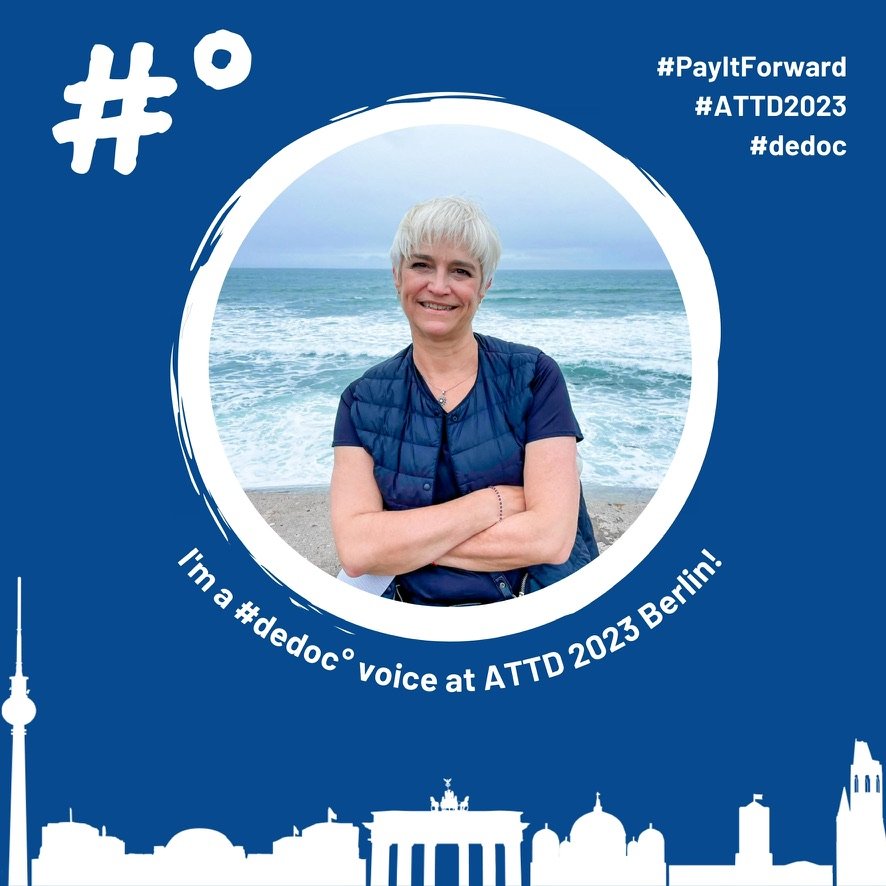Diabetes advocacy: a beginner’s guide to scientific conferences
A scientific conference is an event, usually organized by a scientific society or a group of researchers, at which scientists give presentations describing their research and results. Scientific conferences are a great opportunity to meet new people, network, present research and learn about other research.
In the past, these events were limited to just scientists and researchers. Nowadays this scenario is changing and these conferences are no longer an exclusive venue for researchers and healthcare professionals. As people with diabetes (PWDs), we are now also part of the picture, with our own insights, backgrounds and baggage of lived experience. Through the dedoc° voices scholarship program, PWDs can now attend some of the biggest scientific conferences on diabetes (ATTD, EASD, ISPAD and, most recently, ADA) and report back to our local communities.
Ana has attended ATTD 2023 in Berlin, Germany, and other conferences as a #dedoc° voice. Source: Ana M Alvarez Pagola and #dedoc°
What’s it like to attend a scientific conference?
Scientific conferences can be overwhelming. Truly overwhelming. We would love to do everything, attend every session, learn about all the new developments, network 24/7, spend quality time with friends, old and new… But it’s not possible to do everything and all we can do is make the most of it, the best way we can. Here are some tips that have helped me make attending a conference a bit less overwhelming.
Attending a diabetes conference: top tips for advocates
1. Prepare in advance: make time before the conference to go through the abstracts, talks and exhibitor list to create a draft schedule of what you would like to do. This schedule should not be packed with everything you can fit in, as being exhausted will not let you focus on the talks that are most important to you. You should also include time to unwind and socialise!
#dedoc° voice Ana plans ahead by checking out scientific conferences schedules. Conferences often have their own app with both an overview of sessions on offer that day and more in-depth details on what each session will cover. Source: Ana M Alvarez Pagola
2. Think comfort: as you are likely to be on your feet for most of the day, it is important to wear comfortable shoes and pack lightly to avoid your feet and back being in agony at the end of a long day. But remember to pack additional snacks, water, and juice boxes for unexpected lows, along with an extra infusion set, pens, needles and all of the usual diabetes supplies. Finally, wear layers. Some lecture halls may be cold while other areas of the conference venue may be warm. Layers make it easy to cool down or warm up.
#dedoc° voice and diabetes advocate Ana outside ATTD 2023 — a lightly packed tote bag is easy on shoulders and back, making conference attendance more comfortable, while layered clothing makes it easy to stay warm or cool down depending on the room. Source: Ana M Alvarez Pagola
3. Talk to other dedoc° voices about their schedules: see what they have included and if they have any recommendations. You might find out about other things that interest you. While at a conference, use #dedoc°’s conference-specific WhatsApp groups to share any interesting talks that are happening with each other.
4. Prepare your elevator pitch: have one or two sentences ready for introducing yourself and why you’re attending the conference as a dedoc° voice.
5. Take notes: make notes during talks and poster sessions and write down three take-home messages after each talk.
6. Talk to vendors: the exhibition hall is where all vendors are in one place and is a great opportunity to see and compare devices and software, new developments, promising projects and much more. Vendors at conferences can answer many of our questions and trigger some more.
Promotional materials picked up at one of the scientific conferences Ana attended, featuring new diabetes devices and treatments. Source: Ana M Alvarez Pagola
7. Network: Use any free time you have during the conference to network. Search the conference-specific hashtag, follow #dedoc° on Twitter and see what comes up. Talk to people during coffee breaks. And try not to miss any of the dedoc° voices events which are real fun.
8. Relax! Whenever possible, make time to relax and see the sights of the city you’re in.
#dedoc° voices taking the time to relax between scientific conferences sessions — featuring the above mentioned layers and sensible shoes to help make conferences more comfortable! Source: Ana M Alvarez Pagola
Don’t forget to pay it forward!
#PayItForward: this is at the core of what we do. Each one of us does so in our own special way. Some people will go on to become speakers at future conferences or large diabetes-related events in their own countries. Others will make or star in videos for large audiences or write articles for large circulation publications. Some will go home and share their new knowledge and experience with a few families or provide peer support to small groups of parents or people living with diabetes. And a few others still will turn to humanitarian work in underprivileged areas around our planet or join an organization’s advocacy department. Large or small, in the public eye or in a more private manner, everyone will be paying it forward their own way.
What are your top tips for diabetes advocates attending a scientific conference?
Let us know in the comments! Found this article insightful? Please spread the word and share it with your network.



